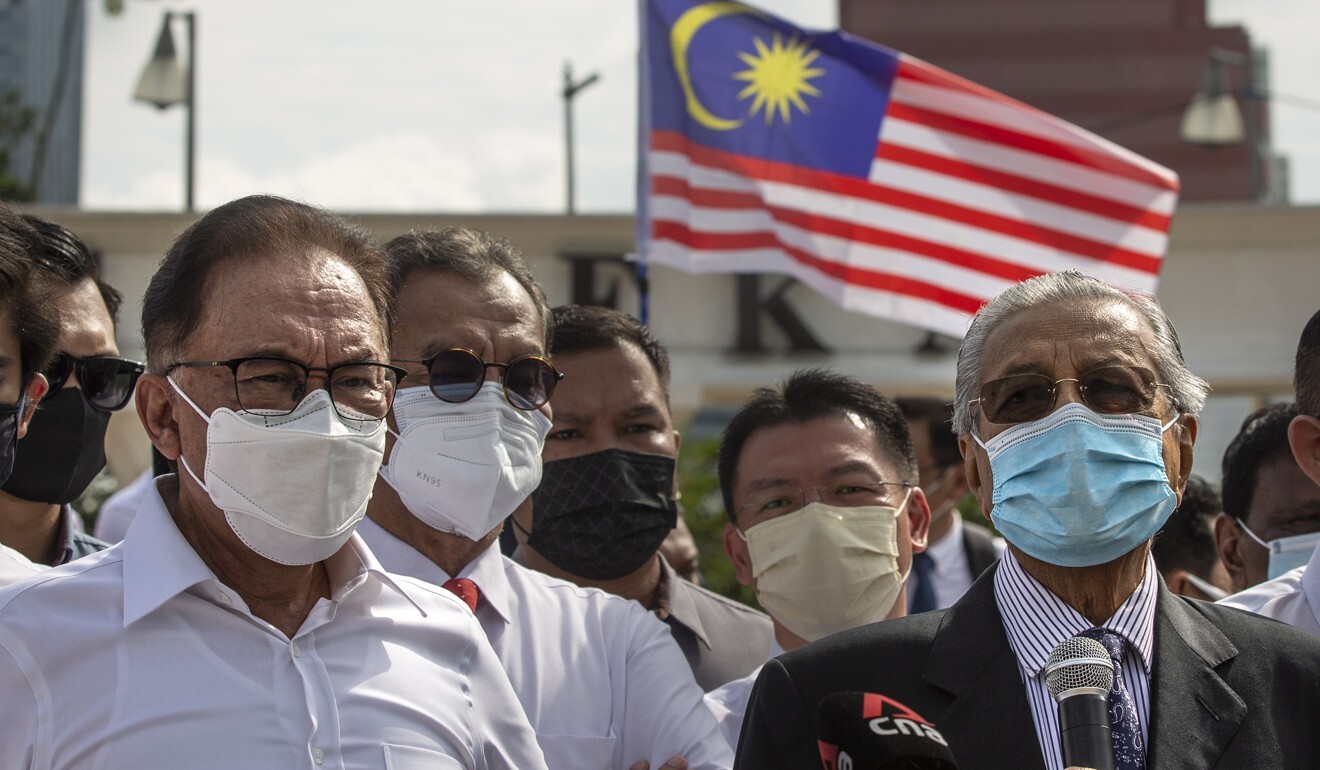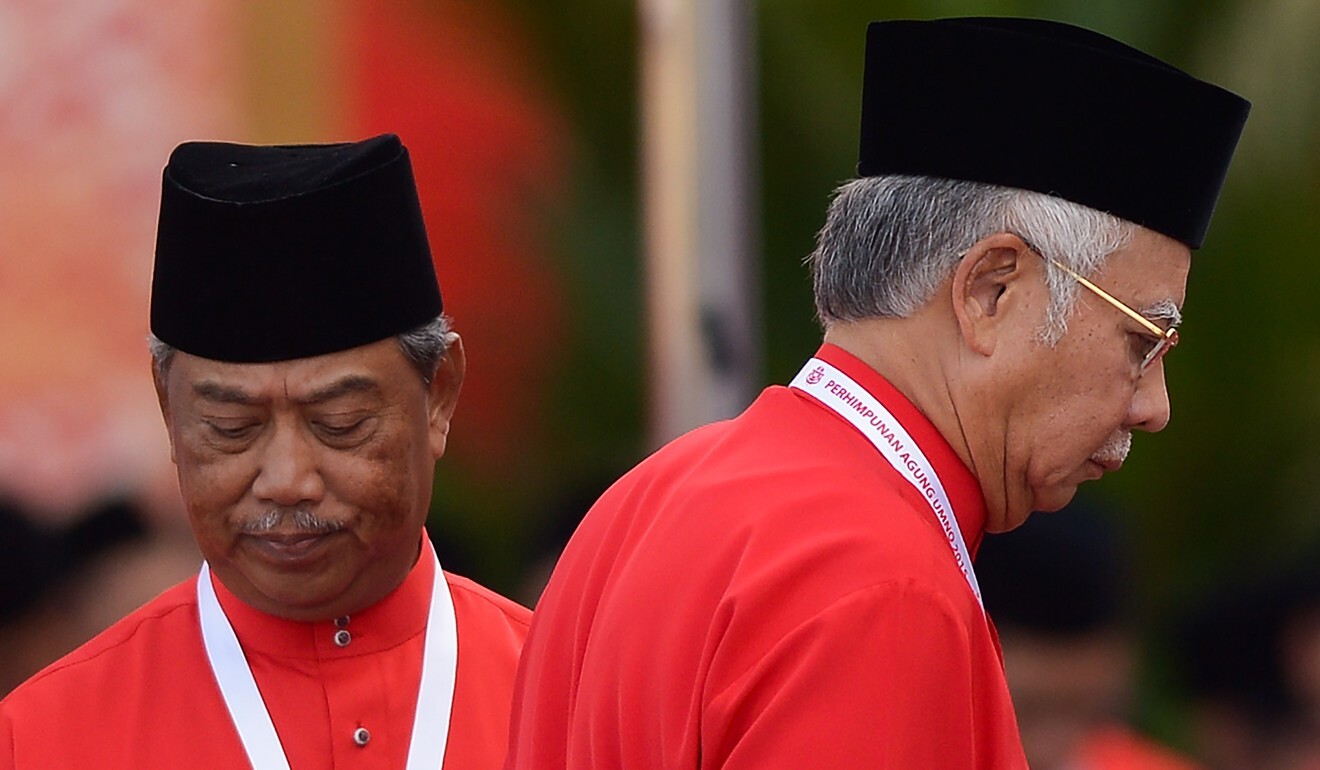
Malaysia’s political crisis: PM Muhyiddin Yassin finally quits, but question mark over successor remains
- Muhyiddin’s departure caps weeks of political turmoil triggered by the Perikatan Nasional government’s loss of majority legislative support
- The veteran politician’s 17-month stint in office following a political coup last March is the shortest in independent Malaysia’s history
The 74-year-old’s departure was expected, after a key minister revealed over the weekend that the prime minister would meet the country’s king, Sultan Abdullah Sultan Ahmad Shah, to tender his resignation and end an impasse triggered by the government’s loss of majority backing in parliament.
“His Majesty has agreed to accept Tan Sri Mahiaddin Yassin’s resignation letter,” said a statement by the Comptroller of the Royal Household Ahmad Fadil Shamsuddin that used the prime minister’s given name.
Malaysia’s political uncertainty has led to an exodus of foreign investors
“Tan Sri Mahiaddin will serve as caretaker Prime Minister until a new Prime Minister is appointed.”
The statement said the monarch was against sanctioning fresh polls, citing the severity of the Covid-19 crisis in the country.
Addressing the nation in a televised speech after the king’s acceptance of his resignation, Muhyiddin struck a defiant tone. He said his efforts to maintain stability amid the coronavirus crisis were thwarted by “some who would rather snatch power than prioritise the lives of the people”.
“I can take the easy route and sacrifice my principles to remain prime minister. But that is not my choice and I will not compromise with kleptocrats or interfere with the independence of the judiciary, just to stay in power,” he said, alluding to the likes of the corruption-tainted ex-prime minister Najib Razak who have been lobbying for his resignation.
Umno, the ruling party from 1957 to 2018, supplies the most number of MPs – 38 in total – to the currently ruling Perikatan Nasional alliance.
The current crisis was triggered after a reported 15 of these Umno MPs pulled their backing for Muhyiddin and reduced his parliamentary support to below a simple majority of 111 among 220 lawmakers.
In the weeks leading to Muhyiddin’s resignation, Umno has been deeply split between one side backing the embattled leader and another led by the likes of Najib who say Muhyiddin’s purportedly weak and haphazard leadership was a liability as the country reels from the Covid-19 crisis.
Manoeuvres afoot
Political observers identified Umno vice-president Ismail Sabri Yaakob, the current deputy prime minister, as the strongest candidate for the prime ministership.
Local media on Sunday reported that the 61-year-old lawyer by training was intensely lobbying for support from within Perikatan Nasional as well as outside the bloc.
Ousted as prime minister by an internal coup staged by Muhyiddin in March last year, 96-year-old Mahathir is part of a new party that on its own has four MPs.
The veteran politician is also said to have sway over MPs from other smaller opposition groups.
The country’s main opposition bloc, Pakatan Harapan – kicked out of power by Muhyiddin’s manoeuvring last year – has other ideas on who should be the country’s ninth prime minister.

Mahathir has been on the record as saying Anwar – a staunch multiracialist – was too polarising a figure for the country’s conservative Malay-Muslim majority.
King Sultan Abdullah will have the final say on what happens next.
The monarch, the head of one of the country’s nine centuries-old royal households, is currently serving a five-year term as Yang di-Pertuan Agong.
The post is similar to that of the British sovereign, granting Sultan Abdullah certain constitutional prerogative powers even though on most issues he must abide by the ruling government’s advice.
His powers in the current scenario are strengthened by a legal precedent set by a 2009 constitutional crisis in the state of Perak.
The sultan in that instance used his discretion to pick a chief minister despite the opposition’s call for fresh polls following the incumbent administration’s loss of majority in the state legislature.
In Malaysia and Tunisia, dysfunctional leadership destabilises democracy
Muhyiddin’s future
Subsequently, he joined hands with Anwar and Mahathir – also former Umno heavyweights – in their ultimately successful endeavour to unseat Umno and Najib in the 2018 polls under the Pakatan Harapan umbrella.
But last February, Muhyiddin wrested power from Pakatan Harapan by instigating mass defections from within the bloc and joining hands with Malay-only groups such as Umno and the hardline Islamist party PAS.
He cited infighting within Pakatan Harapan and the coalition’s neglect of Malay rights as the key reason for his political coup – popularly known as the Sheraton Move – named for the hotel where the plot was finalised.
The machinations saw Mahathir ejected from the Parti Pribumi Bersatu Malaysia (PPBM) that he and Muhyiddin co-founded to topple Najib. PPBM is currently led by the prime minister and has 31 MPs.
The underhanded means through which he came to power meant he was instantly labelled an “illegitimate” leader by Pakatan Harapan supporters.

The prime minister allowed a brief parliamentary session to take place in August, and after much pressure from the king and the opposition, he relented to a September 7 no-confidence vote.
The anti-government bloc comprising Pakatan Harapan, the Mahathir camp and anti-Muhyiddin Umno MPs, lampooned the deal as a blatant offer of “corruption” to save the prime minister’s political skin.
Muhyiddin first became an MP in 1978, and was appointed the chief minister of the state of Johor in 1986. He later was elevated to the federal government, serving in six different ministerial portfolios under four prime ministers.
In 2018, he was diagnosed with pancreatic cancer, but has since been declared cancer-free by his doctors.
In his speech, Muhyiddin said he viewed his ousting as the end of another chapter in his political career.
“Six years ago I was sacked as the deputy prime minister just because I defended my principles by refusing to compromise over the 1MDB scandal,” he said. “I fought, I sacrificed and in the end, God helped me in my struggle. I was entrusted to lead the country as prime minister. However, today it is fated that this will be my last day as prime minister and I accept the will of God.”

